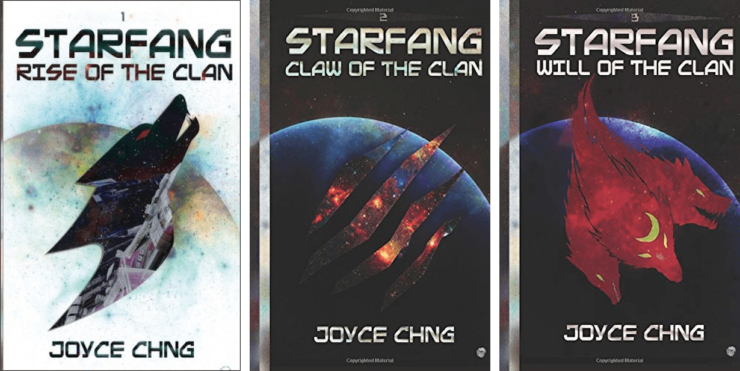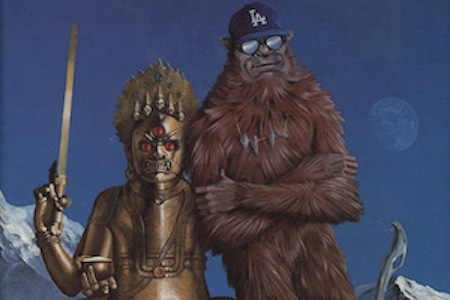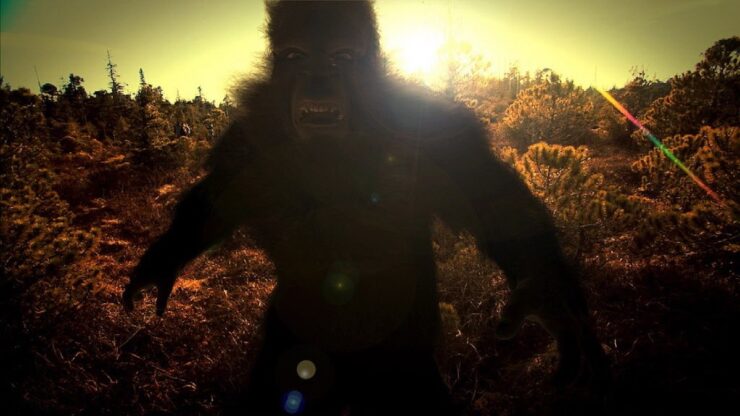The lore of the werewolf inhabits the borders between horror and dark fantasy. The transformation is a work of magic, whether it originates in a Roma curse, an infected bite, a drink of water from a werewolf’s track, a magical plant, the light of the full moon, descent from a line of werewolves, puberty, or any or all of these possibilities. But what about werewolves in the future? Werewolves in space?
Joyce Chng, who also writes as J. Damask, has written of werewolves in contemporary Singapore. They’re normal people with normal lives and normal problems. And they’re hereditary shapeshifters. Their stories settle comfortably into the category of urban fantasy.
Chng has gone on to tell the story of their distant descendants: clans of werewolves populating the stars. It’s honest to goodness space opera, and its protagonist, Francesca Ming Yue, is the heir to a powerful clan of wolf shifters.
Chng’s werewolves are a human subspecies. They’ve been genetically engineered to an extent, but they’ve always lived as both humans and wolves. The transformation is connected to the moons of their home planets, but it’s not restricted to the full moon. They can change at will, though they seldom do so except at home on their own hunting grounds.
Wherever they are, they are predators, proudly and unapologetically so. They hunt for pleasure as well as for food. They travel and hunt in packs, and live by the laws of the clan.
They make a distinction between the human and the wolf. In their universe, humans who do not change into wolves may intermarry with members of the clans, but they’re not equals. The real power resides in the shifters.
That power depends on the combination of human and wolf. Wolves who are not shifters may be cherished as companions, but they’re not equals, either. When a shifter loses the ability to control the change, as has happened with Francesca’s favorite aunt, it’s a tragedy. She’s gradually losing her capacity to reason and to speak; she’s kept in a cage, and will eventually become entirely wolf.
Francesca tells her story in three novella-length parts that fit together into a single story. She is the captain of a clan warship, the Starfang. Her clan has declared blood feud against another clan led by the evil Yeung Leung. Yeung Leung wants to have it all—the whole galaxy. Francesca’s mission, assigned by her parents, the leaders of the clan, is to hunt him down and stop him.
It’s a long journey and often harrowing. Francesca nearly loses her life and her ability to shift. She’s captured, tortured. She finds new family in unexpected places, and she struggles with forbidden love.
This is space opera, oh yes. There are space battles. Political intrigues. Idyllic homeworlds. Battered, odorous, worn-out space stations. Horrible villains. Noble if flawed heroes. Starships of all shapes and sizes, from beat-up traders to swift and deadly warships.
Werewolves and humans share the universe with two other species, the velociraptor-like shishini and the somewhat more humanoid jukka. The jukka would be familiar to Francesca’s distant ancestors in our place and time as beings UFO aficionados call the Grays. As Francesca pursues and is pursued by Yeung Leung, she learns a great deal about both species. In the end, all three disparate species are bound together. It takes their combined powers to save the galaxy.
This is great fun. The story moves fast, and there’s plenty of scope and sweep. The stakes are as high as they can get.
And yet it works best, for me, on a much smaller and more intimate scale. None of the characters in Chng’s compact epic is ever truly alone. Family is at the center of everything. Blood kin, chosen kin. Friends and comrades in arms. Ships’ crew. The core of every werewolf’s existence: the pack.
The members of the clans are both very human and very lupine in how they live in their universe. They don’t question the necessity of the hunt, either as wolves in the forests of the homeworld or as warship crews along the spaceways. They’re suspicious of the outsider and the other, whether it’s a rival clan or a alien species. One of the most difficult lessons Francesca learns is to understand the thought processes of the shishini and the jukka. They are both truly alien, but they find common ground, a good part of it through her.
In a genre that is dominated by the culture and assumptions of White America, Chng’s space opera is wonderfully and thoroughly Asian. Family, food, festivals—they’re all rooted in Southeast Asia, where Chng lives and writes. What people eat and when, how they prepare their food and how they interact as they cook and eat it, helps build the world and move the story forward—and even more so when it’s connected with the succession of festivals that round out the year. The lunar calendar and its festivals are especially apropos for werewolves; they fit perfectly with the nature and origins of homo sapiens lupus.
Judith Tarr is a lifelong horse person. She supports her habit by writing works of fantasy and science fiction as well as historical novels, many of which have been published as ebooks. She’s written a primer for writers who want to write about horses: Writing Horses: The Fine Art of Getting It Right. She lives near Tucson, Arizona with a herd of Lipizzans, a clowder of cats, and a blue-eyed dog.














